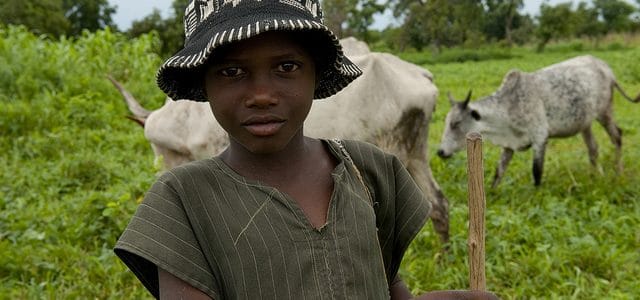
Migration is at the top of the EU’s agenda. While a significant percentage are from the Middle East, the number of migrants from the African continent is also rising. Many African youth first move from rural to urban areas. If still unable to find employment, live their life and carve out a future, migrating abroad is the last resort. This brief focuses on youth moving to urban areas and explores programmes and plans of donors to invest in job creation in Africa’s largest sector, agriculture. It asks if such investments offer a perspective for youth and scrutinizes what sector experts say.
Young men sitting idle beside the road, waiting for work is an all too familiar image from the average African town. Experts wonder, why are they in ‘waithood’, not able to afford proper (mostly imported) food, when Africa and its lands should be able to feed its growing population, which will reach 6 billion in 2050. Currently, 70% of African youth are living in rural areas, mostly working in agriculture, but unprecedented levels of urbanization are expected. So why are young people in Africa not looking for the proverbial greener pastures closer to home?
The conference of the 2Scale programme (under the consortium of IFDC, ICRA and BoP Innovation Centre), which is supported by the Dutch government, identified a number of obstacles faced by young people wishing to engage in agriculture. Among these is the stigma surrounding agriculture as a lifestyle and source of livelihood, restricted access to land, irrelevant education, inability to handle risk and poor access to finance.1
Agriculture is generally perceived by youth as a low-status livelihood that does not offer attractive work opportunities and is, therefore, stigmatized. In addition, rural areas lack the facilities offered by urban areas, not only in terms of health and education, but also connectedness, which is important to young people. In contrast, cities provide young people with opportunities (beyond mere economic opportunities) that are not available in most rural areas: ‘through youth’s eyes, the anonymity of city life is not a threat but a resource: cities are places where they can throw off (or at least delay) adulthood expectations and reinvent themselves. Surviving in cities is hardly easy, but if you “make it” there’s a chance to assume a glow of success that may be forever out of reach in home villages’.2 However, in reality, most youth who migrate to urban areas end up working in the informal sector in survival mode.
When youth, especially women, remain in or move back to rural areas they face another major obstacle: restricted access to land. Land ownership is a politically contentious issue in most of Sub-Saharan Africa. Not only have (government) elites and foreign investors confiscated much of the arable farm land, at the community level, patrimonial structures (e.g., elders) prevent youth from acquiring sufficient land to start farms and earn a decent living from farming. This is further complicated by the fact that in many African countries the amount of arable land is shrinking due to the effects of global warming and climate change, with the number of ‘climate refugees’ growing as a result, as warned by experts at the recent conference on ‘Planetary Security’ organized by the Dutch government.
Moreover, if youth do engage in farming, their education and skills often turn out to be irrelevant. As new entrants in the various agricultural supply chains they need to carve out their niche towards consumers, clients and markets. At the same time young entrepreneurs need to mitigate local power relations in African society, generally not conducive to their ambitions – and even less so to those of women entrepreneurs.
Young agri-entrepreneurs also need to build resilience and cope with risks. A good example is the case of the Kenyan company Shalem Investments, which is run by a young female agri-entrepreneur who supplies sorghum to multinational East African Breweries. An unexpected tax levy hit this company’s profits so hard that it might not have survived without access to finance, which, in this case, was provided by the 2Scale programme. Such situations are particularly challenging for young entrepreneurs who usually do not enjoy the same level of protection that older more established (and male) entrepreneurs may have.
Helping youth to overcome challenges
Lack of governance and high costs are particular problems in Nigeria, but there are ways to help youth overcome these obstacles, according to Yemisi Iranloye, managing director of Psaltry International. She found a good market for her cassava and starch and runs a successful business supplying Nigeria Breweries, a subsidiary of Heineken, in Oyo State in South-West Nigeria. A role model of a successful agri-entrepreneur herself, Iranloye is passionate about attracting more youth back to rural areas.
However, to engage youth in agriculture, they need to be trained for the right purpose and to respond to market needs. They also need to be supported by public-private partnerships. At a macro scale, major investment is needed in agriculture including in infrastructure, distribution, access to finance and the modernization of farming techniques (e.g., through technology and science).3 However, confidence in the government to lead this process in an accountable manner is limited. At a micro scale, Iranloye argues that it is up to the private sector to contribute to countering the negative perceptions that youth have of agriculture as a career and lifting the stigma on agriculture., for example by demonstrating that it is possible to earn a decent living out of an agricultural career in rural areas.. In addition, on-site investment is needed in facilities such as health and education, but also in leisure after work through the provision of social facilities and free Internet to facilitate the ‘connectedness’ that youth desire with their peers and beyond. For Iranloye, these are a crucial part of her business model, which is designed to engage youth with her company.
Iranloye and other role models, such as Ibrahim Fatawu of Fruitland (Ghana) and Ruth Okiror of Acila Enterprises (Uganda), have transformational stories that are bound to inspire a growing number of young people to consider a career in agriculture. Whether or not this will eventually inspire a critical mass to move back to rural areas and help improve food security remains to be seen. Much of the 70% of African youth who are currently in rural areas are expected to migrate to cities in the next decades, but are unlikely to find decent jobs there. Hence, there certainly is a logic behind focusing on the food security-agriculture-employment nexus as reflected in the Sustainable Development Goals (SDG)..
The 2Scale programme is indeed producing tangible results; it helps create new businesses and jobs by focusing on entire agricultural and food supply chains, including processing, marketing and distribution. It also helps develop new products targeted at local low-income consumers, expanding future markets.
Africa’s jobs of the future: gauging the urban migration
It seems that creating the jobs of the future in rural Africa requires a more comprehensive approach beyond such programmes. Such an approach should, according to the situation and context, investigate why governments have failed to create attract investments country-wide, address why youth have been excluded from (not only economic) opportunities and determine whether or not resources such as arable land and water for irrigation will run out in the next decade as the World Resources Institute warned. It should also investigate if the jobs are actually out there, both in rural areas and the urban areas youth are heading to.
More interventions in urban areas are needed to better integrate and transition these young city migrants for services, manufacturing or trade – which might well be in agricultural products. These interventions should draw on specific skills sets of young migrants. They would go a long way toward promoting work for youth, but do not make sense without genuinely addressing structural underdevelopment, un(der)employment, exclusion and inequality. Tackling endemic corruption and bad governance by established elites is key to this, as they have a disproportional effect on youth trying to find work and earn a decent living. Such comprehensive approaches, both in rural and urban areas, in agriculture and other sectors, can help youth in Africa find decent work and stop looking for the proverbial greener pastures elsewhere.










